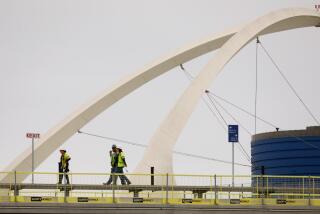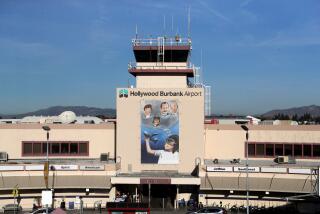$5.5-Billion Facility Not on Open Projects List : U.S. Wants in on Japanese Airport Bids
- Share via
TOKYO — The contracts for a $5.5-billion airport to be built in the next seven years near the Japanese city of Osaka have emerged as yet another irritant in U.S.-Japan economic relations.
American officials, saying that U.S. companies could supply about $500 million worth of equipment and services for the new airport, want the project opened to competitive international bidding.
But corporations in western Japan regard the Kansai airport project as a way to revitalize the local economy. The Kansai, the name of the region around Osaka, has fallen behind eastern Japan economically, and local companies have vied with one another to become shareholders in the airport in the hope of picking up government-funded contracts.
More than 80% of the construction funds are being provided by central and local governments, with the remainder coming from 772 corporations that have bought stock in Kansai Airport Co. The facility, to be built on an artificial island about three miles south of Osaka, will be Japan’s largest.
So far, official Japanese policy on foreign participation has been ambiguous. Although the airport project was listed in English in the Japanese government gazette on Jan. 16, much as if it were a project open to international bidding, Japanese officials insist that the rules of the General Agreement on Tariffs and Trade do not apply.
In 1982, the United States, Japan and other industrialized nations agreed in Geneva to a partial opening of government-funded projects to international competitive bidding as part of GATT. The Kansai airport, which was then in its planning stages, was not included on the list of open projects.
“Placing the project in the gazette was a compromise,” said Koki Nagata, chief public relations officer at Kansai Airport Co. “We are under tremendous pressure from foreign diplomats.”
The U.S. Consulate in Osaka has taken the gazette notice at face value and has sent English versions of application forms to 80 U.S. firms. “We expect about 45 American companies, including some big ones, to send in their papers,” said Keith Bovetti, a commercial officer with the consulate.
Nagata, however, warned that submitting an application indicates nothing more than the company’s desire to “know what is available” and does not mean that the airport construction has become open to international bidding.
American firms are especially qualified to provide in-flight services at the airport, pollution impact studies, runway signs and communications, construction and heavy equipment.
The American response so far has been to lobby in Geneva to have the airport added to the GATT list of open projects and to link Japanese reluctance to welcome foreign participation with Japan’s $49.7-billion trade surplus with the United States.
U.S. Ambassador Mike Mansfield recently told a conference of Japanese businessmen in Kyoto, about 30 miles from Osaka: “There is no excuse for protectionism of any kind in an economy that runs chronic trade surpluses as large as those of Japan. The Kansai (region) has an excellent chance to set an example if all interested firms--domestic and foreign--are given access to construction and supply contracts for the new Kansai International Airport,” he said.
Deputy U.S. Trade Representative Michael Smith also raised the issue of access to airport contracts with a high Transport Ministry official last summer and, according to an American official, the issue was on the agenda in U.S.-Japan trade talks held in Japan this week.
Official attitudes toward opening the bidding to foreign firms range from strong opposition at the Transport Ministry to indications from a Foreign Ministry official that limited foreign participation might be possible.
Transport Ministry officials have been accused in Parliament of using Japan’s airport companies to create sinecures for their retired colleagues. Many of the services at Tokyo’s two airports are supplied by companies headed by former ministry officials.
Three of the 10 top officials of the new Kansai Airport Co., including its president, are retirees from the Transport Ministry.
The Foreign Ministry official endorsed the general principle of letting foreign firms participate, noting that Prime Minister Yasuhiro Nakasone has urged Japanese companies to buy foreign goods to lessen Japan’s huge trade surplus. Nakasone has never specifically discussed the Kansai airport, the official said.
The decision about whether to let the American firms participate will be a “highly political one,” a U.S. official predicted, but so far there is no sign when the Japanese government will decide.
More to Read
Sign up for Essential California
The most important California stories and recommendations in your inbox every morning.
You may occasionally receive promotional content from the Los Angeles Times.












